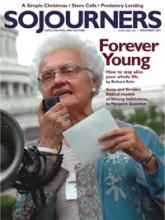El Centro Episcopal is located in Sampson County, a sparsely populated region of southeast North Carolina where farming is still the dominant industry. This small community organization, run by Episcopal Farmworker Ministry (EFM), serves the “invisible” laborers who earn the lowest annual income of all U.S. workers—workers who hand-harvest 85 percent of the produce we eat. Accessible only by a rural road, the facility provides services to more than 6,000 migrant and year-round farm workers each year. Seventeen acres of cotton, bell pepper, soybean, and strawberry fields surround a health clinic, a Head Start day-care facility, a community services building, and a church, La Iglesia de la Sagrada Familia.
It’s not a place you’d expect to find innovative design, but two unique building projects are underway: a community garden and a flea market. With the help of Design Corps, a Raleigh-based architecture organization whose stated mission is “creating positive change in communities through design,” EFM has developed a 20-year plan to respond to the immediate and future needs of the people it serves. The garden will offer workers extra food while the flea market will help bring in extra income. Using research from Wake Forest University about how to address “food insecurity” within the migrant farm worker population, Design Corps’ partnership with EFM provides a design solution to an economic and social justice issue.
Read the Full Article
